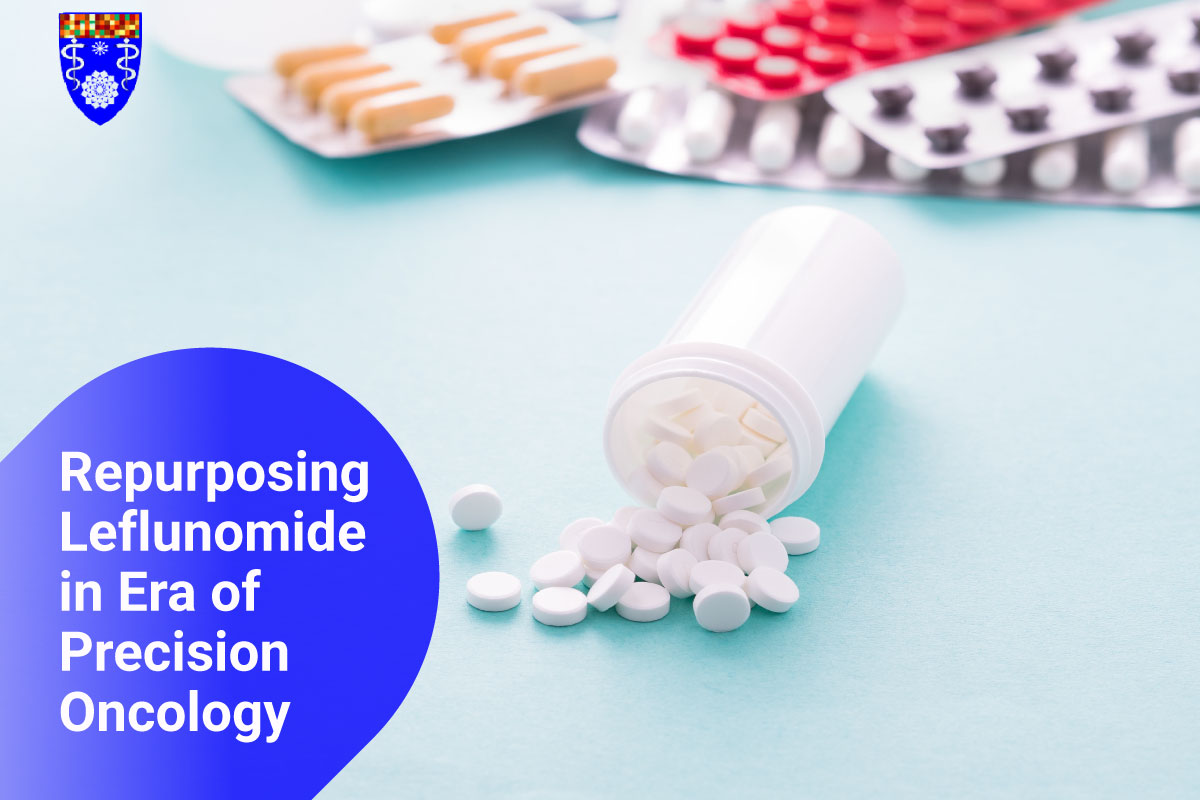Introduction
Drug repurposing has been an emerging trend in modern medical discovery and development. The repositioning of old drugs shows high potential. This method is proving to be successful in today’s era of precision oncology. Old medications contain de-risked compounds, increasing their efficacy and safety. In addition, their development period is much shorter, and they are cost-effective.
One such drug is leflunomide. This medication is primarily for treating rheumatoid arthritis. However, pharmaceutical companies and doctors have unlocked the drug’s potential to treat cancers. This article will discuss leflunomide’s definition and its benefits in cancer treatment. So, without further delay, let’s begin.
What is Leflunomide?
Leflunomide (Arava) is a medication used for rheumatoid arthritis. It is under the category of drugs known as Disease-Modifying Antirheumatic Drugs or (DMARDs). Therefore, it is effective in reducing joint damage caused by rheumatoid arthritis.
Leflunomide’s immunosuppressive agent successfully treated over 300,000 patients with rheumatoid arthritis. Its active biotransformation, called teriflunomide or (Ter), directly inhibits dihydroorotate dehydrogenase (DHODH). (an enzyme involved in nucleoside synthesis.)
Leflunomide and Cancer
Background
The loss of Phosphatase and TENsin homolog deleted on chromosome 10 PTEN function is present in up to 50% of late-stage prostate cancers. Therefore, that becomes a potential target for therapeutics. Cells with PTEN deficiency depend on de novo pyrimidine synthesis – a feature that presents a vulnerability.
Methods
In vitro growth assays and in vivo xenograft models were used to test the effect of de novo pyrimidine synthesis inhibition on prostate cell lines.
Results
PTEN-deficient prostate cancer cell lines are susceptible to inhibiting de novo pyrimidine synthesis by leflunomide. Tumor growth inhibition was observed in vitro and in vivo following leflunomide treatment and is likely due to an overwhelming accumulation of DNA damage.
Conclusions
The work highlights that synthetic lethality arises upon PTEN loss and leflunomide treatment in prostate cancer and may present a therapeutic opportunity for this patient population.
Leflunomide for Relapsed/Refractory Multiple Myeloma (MM)
Leflunomide shows significant activities in multiple myeloma or MM based on preclinical studies.
Phase 1 Study
One patient received 20 and 40 mg of leflunomide at levels 1 and 2.
Observation result: No dose-limiting toxicities or (DLTs).
Three other patients did not show signs of dose-limiting toxicities in phase 1.
Dose level three.
Observation result: One patient experienced elevated alanine aminotransferase at dose level 3 (60 mg)
Three other patients did not show dose-limiting toxicities at this level.
Leflunomide inhibits the growth of cancer cells by blocking some of the enzymes in cell growth. Immunotherapy and pomalidomide change the immune system and interfere with the tumor cells growth and proliferation.
Additional Information:
Leflunomide for High-Risk Smoldering Multiple Myeloma
Patients: African-American/ European-American
Phase 2 Study
Leflunomide helps decrease the body’s immune system’s response, which delays the symptoms of multiple myeloma.
Leflunomide for PTEN-Null Advanced Solid Tumors
Phase IA/IB
Patients with PTEN-null solid tumors (tumors that already spread in multiple places in the body) experienced positive results with leflunomide treatment. The observation confirms leflunomide interfered with the growth of cancer cells, causing them to die out.
Leflunomide for Severe COVID‐19 Patients with Concurrent Malignancy
Phase I and II
Leflunomide restricts the virus from making copies of itself. It inhibits the formation of ribonucleic acid (RNA). As a result, researchers say that it is potentially effective in treating patients with cancer and the COVID-19 virus. New discoveries about COVID-19 treatments are beneficial to doctors and patients alike.
Overall Clinical Trial Result
The overall result shows promising potential. Toxicity levels are infrequent and manageable. One study shows that one out of eleven patients attained stable disease (SD), which experienced SD for more than one year.
Leflunomide has a high tolerability safety profile, making it safe and convenient. What’s more, it shows great potential in disease stabilization, based on the phase study conducted. In addition, it has proven effective in delaying the progression of multiple myeloma. Therefore, future studies of leflunomide in combination with other MM medication types will benefit Oncologists. Above all, the cancer patients.
How to Take Leflunomide
Leflunomide comes in tablets or capsules. Take this medication by mouth.
Recommended Dosing of Leflunomide
The usual recommendation to take leflunomide is once a day. On the contrary, doctors may recommend higher dosing in the first three days of the initial treatment period. It is imperative to note that the consumption of leflunomide should only be as doctors recommend. Never increase or decrease the dosing without the doctor’s approval.
Why Leflunomide is Ideal for Repositioning and Cancer Treatment
One of the best reasons leflunomide is ideal for cancer treatment is its reduced risk of liver toxicity. In addition, it decreases the proliferation of cancer cells. Above all, it is inexpensive compared with other repurposed drugs.
On the other hand, their timeline development is shorter. In this aspect, doctors have more time to use whenever relapses or complications occur in their patients. Speed and efficiency are crucial in treating cancer. It could increase the chances of saving more lives.
Final Word
We hope that we have provided helpful information about leflunomide’s definition, potential, and benefits. The only thing left now is to find the most reliable oncologist and medical team to administer this life-saving drug.
Improve Your Quality of Living with Omega Precision Oncology
The Institute of Integrative BioOncology offers a wide array of cancer management services based on years of research and proven treatment methods. We understand that there are many types of cancers. Therefore, we tailor our services based on our patient’s specific needs. We are part of the new era of precision oncology, our intention is to provide you with quality treatment using repurposed drugs. If you want to improve your quality of life while living with cancer, we are the best team to contact.
No other oncologist can provide you with top-notch integrative cancer care than Dr. Paul Zhang. He specializes in evidence-based cancer treatment and management with years of experience and a proven track record.
Off-label medicine is one of approaches in treating cancers. Call today for more information. Dial 713-797-1900.




